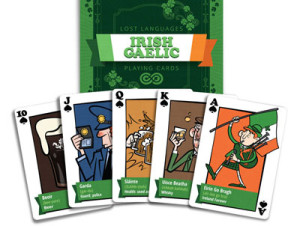 Michael Oraschewsky was attending the Philipps University of Marburg in 2001, majoring in political science and German linguistics. Most of his friends on campus were Irish. That’s when he discovered: those Irish people have a language all their own.
Michael Oraschewsky was attending the Philipps University of Marburg in 2001, majoring in political science and German linguistics. Most of his friends on campus were Irish. That’s when he discovered: those Irish people have a language all their own.
“They had their own secret language that no one else knew. Nobody had any clue what they were talking about. It was just what they learned at school. I thought that was cool. It’s a beautiful language. It sounds like something you would hear in “Lord of the Rings,” a really ancient language. It was like nothing else I’d ever heard.”
Though Oraschewsky never learned the language, he heard it spoken a good deal in the Irish Gaeltacht—areas of Ireland where Irish is spoken—when he joined his Irish friends of the Christmas holidays in 2001. He couldn’t afford a plane trip all the way back to the states, but a trip to Ireland was cheap. “My Irish friends invited me to come and travel around Ireland and stay at their houses,” Oraschewsky says. “It was just incredible. I absolutely loved my time in Ireland when I was abroad.”
Oraschewsky has always had a love of languages, and his interest in Ireland’s native language in particular always stuck with him. That interest came in handy when he and his partner, Eric Brewstein, came up with an idea to help non-native speakers learn handy Irish words of phrases—exactly 54 words and phrases.
The firm’s “Lost Languages: Irish Gaelic” playing cards recently raised $5,884 in start-up funds on the crowd-funding website Kickstarter. The initial goal was $5,750.
Each card contains an word or phrase, a translation, and phonetic pronunciation. Some of the useful words: “beoir” (beer), “uisce beatha” (whiskey), and “Slainte” (an Irish toast).
Also, “Garda” (police)—someone to look out for as you’re strolling back home in the wee hours after consuming too much beoir and uisce beatha. And saying “Slainte” way too many times.
Of course, most of the cards include translations of common greetings and salutations like “please” and “thank you,” and basic, sometimes essential, words like “mother,” “father,” “tea” and “men’s room.”
“You had to have ‘whiskey’ and ‘beer,’ and certain locations like Dublin and Cork, and things associated with family,’’ Oraschewsky says. “With every culture, family is paramount.”
Oraschewsky and his partner researched the most common and most useful words and phrases online, and then presented them to his cousin’s wife, the native Irish Claire Powers, for proofing. Next up: manufacturing the cards, and selling them online. As it happens, Oraschewsky and Brewstein already have a time-tested model for the whole process. It’s their first “Lost Languages” playing card deck in Yiddish.
“My partner Eric who started this with me is Jewish,” Oraschewsky says. “He promised his bubbe (grandmother) before she passed that he would use Yiddish more in his house with his son. That was a way of fulfilling her wish.”
If his last name isn’t already a dead giveaway, you won’t be surprised to learn that Oraschewsky has very little Irish heritage. “My connection with Ireland is solely from the friendships I forged in Europe. I have a grandfather who is part Irish, but that part is long distant. I’m much more aware of my own ancestry, which is German and Russian, with a little Greek and Italian in there, too.”
Although Oraschewsky expects Irish-Americans will constitute the primary audience for the new Irish Gaelic playing cards, he believes there are many other people like himself who aren’t Irish, but who nonetheless love Irish history and culture. The cards will be available online soon.
“On Kickstarter, there was definitely a broader audience,” says Oraschewsky. “That community is generally interested in cool new things. Going forward, we’re also going to focus on Irish gift shops, and people of Irish descent who want to get a cool gift for their grandmom or their kids. It shows you a little something about your heritage, totally unique. But were not talking about it as just for Irish, specifically. Ireland has a magical, mythical aura around it, so people who don’t have any special ties to it still want to see it. Ireland has a draw for everyone, with its history and its struggles. Most people can relate to their life.”
